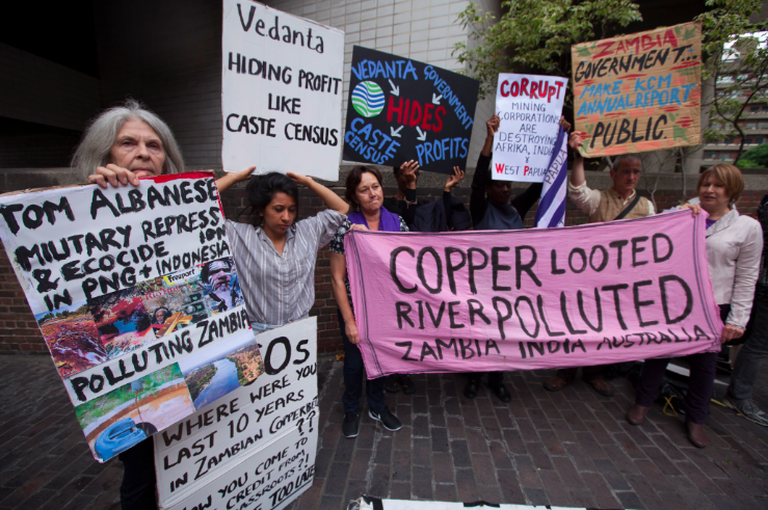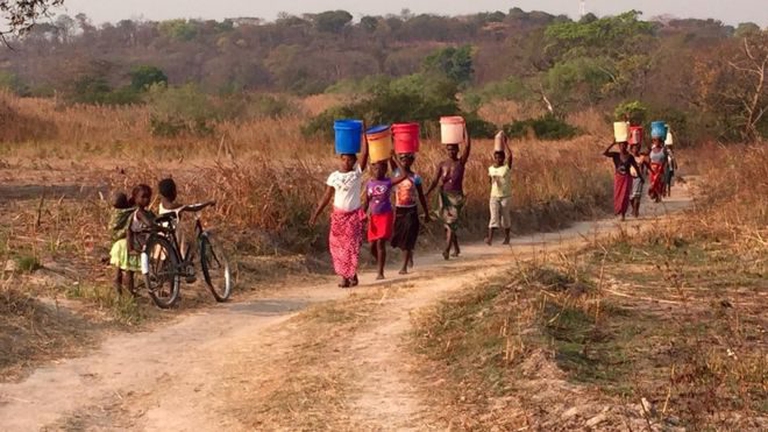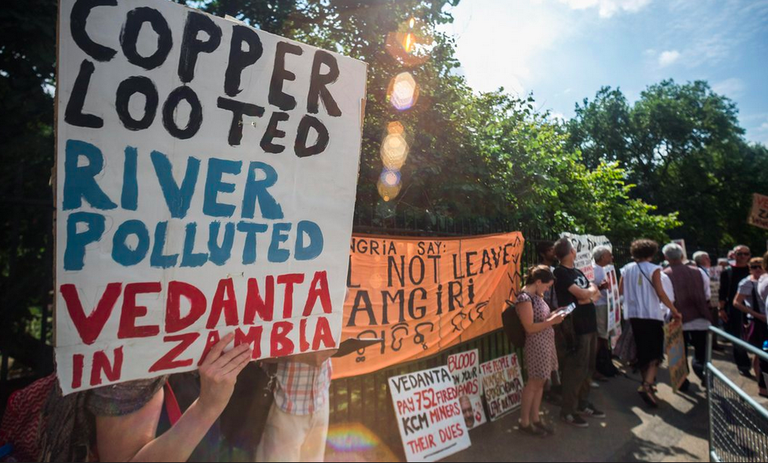
Sharon Lavigne, one of the six winners of the 2021 Goldman Environmental Prize, is fighting to protect her community from plastics corporations.
1,800 villagers living downstream the Konkola Copper Mines (KCM) in the Zambian Copperbelt region are demanding an end to 12 years of pollution near the town of Chingola and KCM’s Nchanga copper mine, which has turned the adjacent Kafue into a river of acid. The villagers are suing Vedanta, a London-based mining group, and its subsidiary KCM in
1,800 villagers living downstream the Konkola Copper Mines (KCM) in the Zambian Copperbelt region are demanding an end to 12 years of pollution near the town of Chingola and KCM’s Nchanga copper mine, which has turned the adjacent Kafue into a river of acid. The villagers are suing Vedanta, a London-based mining group, and its subsidiary KCM in the UK for personal injury and loss of livelihood, having won a previous High Court hearing that decided they could pursue the case in the country’s courts.
People from the four villages of Shimulala, Hippo Pool, Hellen and Kakosa are seeking compensation for loss and damage to their land and health. They claim their primary sources for drinking, washing, bathing and irrigating farms are surface water and shallow wells next to the giant Nchanga copper mine. A number of scientific papers have documented the extent of contamination of these, with acidity and heavy metal contents regularly tens and even hundreds of times above legal limits.
One villager, Judith Kapumba, gave video testimony of how contamination has destroyed local community’s livelihood and lives, claiming that many have “collapsed and died” as a result of illnesses caused by drinking contaminated water, and that crops can no longer grow, leading to starvation and poverty.
During the UK court hearing Vedanta argued that the case against it and KCM should be heard in Zambia. But High Court judge Sir Peter Coulson dismissed the multinational’s claims, saying he feared that villagers wouldn’t get justice in their own country because they wouldn’t be able to afford lawyers and adding that the Zambian legal system wouldn’t be able to cope with such a large and long trial.
KCM is guilty of financial secrecy, historical dishonesty and attempts to pervert the course of justice, according to Judge Coulson’s sentence, as reported by the Phulbari Solidarity Group, which opposes a proposed open-pit mine in Bangladesh’s Phulbari region. During the trial, in fact, it was revealed that KCM has never filed annual accounts to the Zambian government in accordance with the Zambian Companies Act.
Meanwhile, Vedanta has issued an announcement to the London Stock Exchange indicating that it is considering whether to appeal the decision. The full trial is likely to take place before the end of 2017.
Siamo anche su WhatsApp. Segui il canale ufficiale LifeGate per restare aggiornata, aggiornato sulle ultime notizie e sulle nostre attività.
![]()
Quest'opera è distribuita con Licenza Creative Commons Attribuzione - Non commerciale - Non opere derivate 4.0 Internazionale.
Sharon Lavigne, one of the six winners of the 2021 Goldman Environmental Prize, is fighting to protect her community from plastics corporations.
Plastic pollution is airborne too. Microplastics are being carried across continents by the wind, as a recent study reveals.
Levels of particulates in New Delhi in 2020 were once again far above safety thresholds, with extremely serious health consequences for its citizens.
A major oil spill in the Ecuadorian Amazon in April has left the Coca River polluted. The indigenous Kichwa are suing the companies whose pipelines broke.
Molecules that eat up plastic waste, including PET bottles, may soon become widely used as scientists leap ahead in developing new super enzymes.
In Italy’s Land of Fires between Naples and Caserta, activists like Carmen Medaglia are fighting to promote new ways of managing waste.
Toxic substances in Kamchatka’s waters have killed 95% of marine fauna and caused health problems for surfers. The causes, however, are still unknown.
A Magellanic penguin was found lifeless on a Brazilian beach: in its stomach, an N95 face mask. Researchers believe the animal died from ingesting it.
The drop in air pollution during worldwide lockdowns helped prevent thousands of premature deaths. But the situation is returning to pre-crisis levels.










